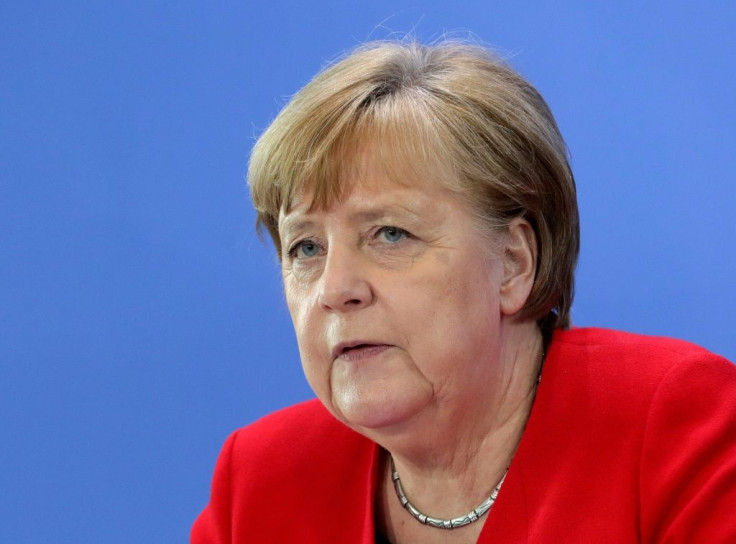Germany In Recession: Economy Shrank By 2.2% In First Quarter

KEY POINTS
- Germany’s gross domestic product contracted by 2.2% in the first quarter of 2020
- Germany has now contracted two straight quarters, meaning it's in a recession
- The government expects the German economy to shrink by 6.3% for the full year
Germany’s gross domestic product contracted by 2.2% in the first quarter of 2020 compared to the fourth quarter of 2019, as the nation’s economy began a lockdown in mid-March to control the spread of the coronavirus.
It marked the largest quarterly decline since the first quarter of 2009 during the global financial crisis.
Germany’s fourth quarter 2019 GDP was revised to a contraction of 0.1%, which technically means the country is now in a recession.
The government’s statistic agency said private consumer spending "declined sharply" during the quarter, along with spending on industrial equipment, including machinery and vehicles. Exports and imports both plunged during the quarter.
"The German economy has been tiptoeing on the edge of recession since the beginning of 2019, but it can hide no longer," said Claus Vistesen, chief eurozone economist at Pantheon Macroeconomics in Newcastle-Upon-Tyne, U.K.
The Federal Statistical Office of Germany expects the second quarter of 2020 to post even worse results – it predicts an unprecedented 10% drop in GDP for the period, reflecting heavier lockdown measures.
“Things will get worse before they get better,” said Carsten Brzeski, chief economist of ING-Germany. “To be more precise, incoming data will be worse, even though the worst might already be behind us. If [Friday’s] data are the result of two weeks of lockdown, three more weeks of lockdown and a very gradual lifting of some measures do not bode well for the second quarter.”
The government expects the German economy to shrink by 6.3% for the full calendar year 2020.
“We will experience the worst recession in the history of the Federal Republic [which was founded in 1949]" said Economy Minister Peter Altmaier. (In 2009, the economy contracted by more than 5%.)
Still, Germany’s first quarter performance was better than France and Italy, which contracted by 5.8% and 4.7%, respectively. This outperformance may reflect the impact of an unprecedented €750 billion ($810 billion) rescue package the German government unveiled in late March.
Germany has now gradually begun to reopen some shops and factories, although many businesses remain closed.
Altmaier also said the economy will likely bottom out by the end of June and then start expanding again – he predicted 5.2% growth in 2021.
"Only if we lift economic and social restrictions step-by-step, and with a sense of proportion, can we start with the slow recovery in the second half of the year," Altmaier said.
However, Marcel Fratzscher, the head of the German Institute of Economic Research rejected Altmaier’s projections as merely "wishful thinking."
"Those are not really forecasts, those are scenarios... scenarios assuming that there is no second wave of [coronavirus] infections, assuming that there is no new lockdown in the future," Fratzscher said. "That's wishful thinking -- that the economy will recover next year. Clearly the answer to how will the economy get out of recession depends very much on the pandemic itself."
Still, Fratzscher praised the German government's efforts to control the spread of the virus and mitigate its economic impact.
"Hardly any government in the world has spent more money on stabilizing the economy, providing support to companies, direct financial transfers, [and] huge guarantees for bank loans, particularly to small-to-medium-sized enterprises,” he added.
On Friday, Germany’s Economy Ministry reiterated that the country has passed the worst of the economic malaise.
“The recovery began with the cautious lifting of the lockdown at the beginning of May,” the ministry said. “But this process will take a longer time due to the continuation of the [coronavirus] pandemic.”
Coronavirus containment measures in Germany appear to have been relatively successful. As of Friday morning, Germany reported 174,478 cases and 7,884 deaths.
But a poll taken by German public broadcaster ARD revealed that 56% of respondents do not want the government to lift the lockdown yet. Those who called for an easing of the restrictions said they tended to support Germany's pro-business Free Democrats party or the extreme-right Alternative for Germany party.
© Copyright IBTimes 2025. All rights reserved.





















